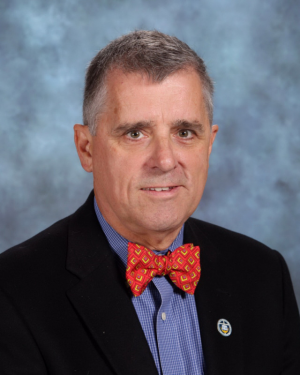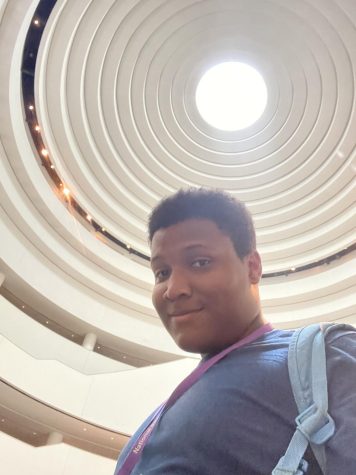
Drawn to a career in education by his passion for reading and studying literature when he was a student, the end of the current 2023 academic year closes the book on 39 years in education for Dr. Paul Barker, President of Our Lady of Good Counsel High School.
This interview is the first in a three-part series which explores what he was like as a student, how he became a school leader, and what his plans include for a peaceful retirement in his home country, New Zealand.
His student experience and life before GC
Q: Can you tell me a little bit about what kind of student you were like back when you were in high school? What Interested you, what clubs were you in, what standard or upper-level classes did you take?
A: Well, I went to high school in New Zealand, a little bit different there, you know? It’s five years in most New Zealand high schools, but it ends up being the same number of years as kids go to school here. It’s just structured differently.
I did well. I was either first or second in my class pretty much throughout. I thought I was good at everything until, in the last couple of years, I just learned that the math and the science stuff was less my strength and the history and the literature was.
I think I was a fairly studious guy, but I also played sports. Cricket was my main sport, reasonably good at that. I coached when I was in high school, coached like middle school kids for rugby. I did debate. I did the newspaper too. In my senior year, I was in the school play. My last three years of high school I attended a boarding school. That was fun.
Q: What drew you to education? Did you have a specific role model or inspiration?
A: Here we talk a lot about the Xavarian Brothers, but we don’t have any [on campus]. I was educated by the Marist Brothers in New Zealand and school had a lot of Marist Brothers [on campus]. I think a lot of those brothers were very influential on me. They were great men, great teachers. That was their life – to be committed to education and stuff. So, yeah, I think I was inspired by them and my senior year English teacher, Brother Roger. [When I graduated,] I went off and [became] an English major. Probably about eight years later, I ended up returning to that school to teach for a couple of years, and Brother Roger was the principal who hired me. He was a really terrific leader. He was an influential person.
Um, that probably at least made me think I was reasonably good at the English stuff. And so I did an undergraduate degree in English, and I took a lot of classes in New Zealand. If you’re an English major, you don’t have to do any courses in math or science, you do English. And I remember my undergraduate degree was 108 credits in total and] I did literature in probably 80-something of those classes.
Yeah. I was really interested in a ton of other stuff, too. I think I did one class in Spanish and one class in education, but, you know, everything else was sort of literature-focused.
Q: I know you were an English teacher when you began your career. What drew you to that role? What was your favorite part of being in the classroom? What was your favorite and least favorite thing to teach?
A: I always liked talking about poetry. Um, yesterday I was a guest [speaker] at the poetry club here at school. We just read poetry for almost an hour. Some of it we read aloud and some we just just read [silently]. So I’ve always liked discussion-based [experiences] and classes.
So that sort of sitting in a circle kind of [approach] is my preferred way of learning. I guess it’s because I went to St. John’s College in Annapolis for one of my graduate degrees (I did a Master’s degree there.) And that whole program is about great books. You don’t really write papers. You sit around a table and you talk about them.
It’s still the best education I’ve ever had. Like really learning, really thinking, really learning. I used that. It sort of changed my view of teaching and almost turned it on its head. I came to understand that it’s not the idea that you can learn so much from but other people. You can have your own mind changed if that dynamic works well for you.
And I think, after I graduated from St. John’s, it made me a much better teacher. I think I was much more focused on how everybody is learning than what I am teaching, you know? [That turning education] on its head from [its traditional sense of], “I’m the teacher. You are the learner and here’s all the content,” shifted to, “You are the learner. What do you need to learn? How do we help you learn?” It became less about what I know [more about the students’ needs]. It made a big impact on me!
These days I try to stay up to date with what [poetry’s] being published, but it’s so much, one can’t really do that. I buy the poetry I like [when I browse the store]. If I find somebody who I really like, I’ll try to read all of [his or her work]. It’s like the way we watch Netflix, right? You find a show you like. Yes, sit down. Watch it all. Last year at graduation when I spoke, I quoted a poet whose book I had just picked up at a bookstore. I opened it up. “Oh, that looks interesting.” I bought it. And, anyway, I liked it. He had a line that I used in my speech. I even tracked him down through Google and wrote him a note. He wrote me a note back. I thought that was pretty cool.
Mostly modern, mostly poetry that’s being written these days, rather than 19th century or anything like that. I’ve got a whole bin of poetry books in my closet right now that I brought to the club meeting.

